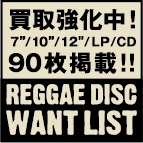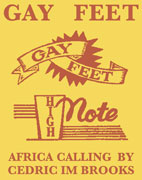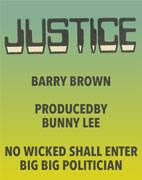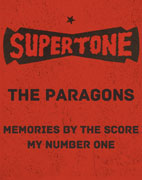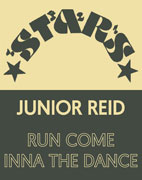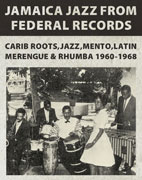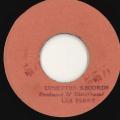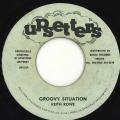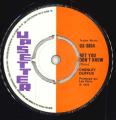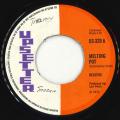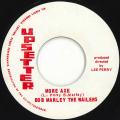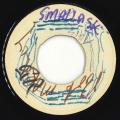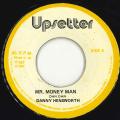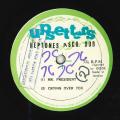Black Ark / Black Art / Upsetter / OrchidText by Harry Hawks
Lee 'Scratch' Perry is responsible for creating some of the most complex and mystical music to ever come out of Jamaica, or anywhere else, in his Black Ark studio. His importance to the history of Jamaican music in particular and recorded music in general is incalculable.
Black Ark / Black Art / Upsetter / Orchid
| Founded | 1973 |
| Place of Establishment | 5 Cardiff Crescent, Washington Gardens, Kingston 20 Kingston Jamaica |
| Main Studio(s) | Black Ark |
| Founder | Lee Perry |
| Producer(s) | |
| Engineer(s) | Lee Perry |
| Related Artist(s) | |
| Related Label(s) |
'Give Me Justice', a characteristic dig at Coxsone, was surreptitiously recorded at Studio One and released on Sir JJ's label. As rock steady began to eclipse ska his collaborations with former rival Prince Buster, 'Judge Dread', 'Johnny Cool' and 'Ghost Dance', encapsulated Kingston's rude boy lawlessness and the sufferers' hero worship of the rude boys. However, he desired still greater independence and Scratch moved on to WIRL (West Indies Records Limited) where he set up an arrangement to "record now and pay later" and to supervise other recording sessions as part of the deal.
Scratch also worked with Joe Gibbs where the b-side to the The Pioneers' 'Jackpot' proved to be the precursor for much of his later music. 'Kimble', a version to the mournful 'Seeing Is Knowing', featured Scratch acting out the part of the villain in the popular television show 'The Fugitive' accompanied by various sound effects including breaking bottles. He continued to work with Joe Gibbs throughout 1967 and 'The Upsetter' (also known as 'I Am The Upsetter') from the end of that year was another forceful musical attack on Coxsone. It would also provide Scratch with the name for his own label when he left Joe the following year.
Lynford 'Andy Capp' Anderson was a vital part of WIRL's organisation and had no equal as a recording and mastering engineer. Lynford and Scratch set up their Upset label in 1967 and their 1968 release, a fairly straightforward interpretation of The Drifters' 'Honey Love' sung by Burt Walters, proved to be a musical milestone. The b-side 'Evol Yenoh' featured the original rhythm with the entire vocal track played backwards over it! 'People Funny Boy', a musical attack on Joe Gibbs, was a huge hit on Upset in Jamaica and in the UK where it was released on Doctor Bird. The record heralded the arrival of faster, more aggressive, reggae rhythms and Scratch would go on to perfect this beat on a series of releases for his own Upsetter label.
The Upsetter Record Shop opened in 1969 at 36 Charles Street and it became the base for Lee Perry's operations. There was a room at the back of the shop where auditions and rehearsals were held. It soon became a magnet for young, hopeful singers and musicians looking to record for Scratch and for sound system operators and club owners looking for the latest releases and exclusive dubs. The hits on Upsetter never stopped: 'Tighten Up' (from either The Inspirations (Jimmy & Ranny) on the Upsetter label in Jamaica or The Untouchables on the Trojan release in London) gave the name to a series of albums on Trojan that were pivotal in promoting and crossing over Jamaican music in the UK. When reggae really broke through in the autumn of 1969 the scorching Upsetter instrumental 'Return Of Django' featuring Val Bennett reached Number Five in the UK National Charts.
In 1970 Scratch teamed up with Bob Marley & The Wailers again and he gave their music a different direction to explore and ultimately exploit. By doing away with the obvious trappings of commercialism they would go on to become reggae's most commercial group ever and Jamaica's first global stars... but The Wailers and The Upsetter parted company in 1971.
Scratch had preferred to record at WIRL studios but when Randys set up their studio above their shop at 17 North Parade he began to work there too. He sometimes recorded at Studio One or Federal and was among the first to use the Hookim(Joseph Hookim)'s Channel One Studio. He was most comfortable when building rhythms at Dynamic Sounds and overdubbing at King Tubby's. He had begun to mix some of his recordings at King Tubby's Waterhouse studio in 1972 including 'French Connection' "a must for your selection". But the sounds that Scratch heard in his head could never be fully realised in someone else's studio at an hourly rate. He began work on his own studio in the yard of his house in Cardiff Crescent early in 1973. He had been saving "whatever surplus money they could find with the express determination to build a studio" and was the builders were guitarist Bobby Aitken assisted by Ethiopians Leonard Dillon and "a handyman known as Django". With the opening of the Black Ark all that Lee Perry had been working towards in the preceding ten years finally came together.
"The creation of the Black Ark studio began a new period of enthusiasm and optimism for Lee Perry..." David Katz
By late 1973 the Black Ark studio was up and running with basic equipment and Scratch's music began to become increasingly intense, multi-layered and extraordinarily experimental. For the next six years the Black Ark would set standards that have seldom been bettered and move in ways that no-one else has, even now, thought to consider.
"People thought his equipment was a joke but Lee Perry made it work." Roy Cousins
The first hit to come out of the Black Ark was Leo Graham's 'Black Candle' a rhythmically sparse Obeah based record that inspired several further versions and the studio soon came alive with frantic, frenetic creativity. The Black Ark version of Millie Jackson's 'Hurt So Good' performed by Susan Cadogan was licensed to Magnet Records in London and reached Number Four in the UK National Charts in April 1975. Scratch used the advance to buy instruments and a more sophisticated mixing board and Tippertone main man, Jah Wise, decorated the Black Ark with murals the following year.
In the ghettos of downtown Kingston the tension was rising to intolerable levels. Michael Manley declared a State Of Emergency in June 1976 as the internecine strife between supporters of Jamaica's two main political parties, the JLP and the PNP, reached another bloody climax in the build up to December's elections. Two Black Ark records, Max Romeo's 'War In A Babylon' (originally entitled 'Sipple Out Deh') and Junior Murvin's 'Police & Thieves', were regarded by many observers as two of the best of the time. Both pointed out the pointlessness of the conflict. 'Police & Thieves' proved to be an even bigger seller in the UK and the Island release played as part of the soundtrack to the violent disturbances at West London's Notting Hill Carnival in August of that year.
Other producers and artists began to use the Black Ark including Augustus Pablo, Phil Pratt, Little Roy and members of the Tafari Syndicate, Winston 'Niney 'The Observer' Holness whose groundbreaking Dennis Brown hit 'Wolf & Leopard' was "recorded entirely" at the Black Ark, Vivian 'Yabby You' Jackson(Vivian Jackson), Dr. Alimantado whose 'Best Dressed Chicken In Town' was masterminded on Cardiff Crescent and Winston Edwards whose 'King Tubby Meets The Upsetter At The Grass Roots Of Dub' album was the record that finally sold the concept of dub to the more mainstream UK reggae audience.
Lee Perry continued to record and release his own idiosyncratic collections of instrumentals and dubs and 'Scratch The Super Ape' boosted his international reputation still further when it was released on Island Records as 'Super Ape' in 1976. He was asked by The Clash, who had covered 'Police & Thieves' on their debut album, to produce 'Complete Control' in 1977. He continued to work occasionally with Bob Marley. Their 'Jah Live', an affirmation of Rastafari after the death of Haile Selassie recorded at Harry J's with its chilling dub version 'Concrete', a second cut to 'Smile Jamaica', the stark, haunting 'I Know A Place' and 'Who Colt The Game' stand as some of Bob Marley's best records of the late seventies.
Much of the music emanating from the Black Ark at this time represents the height of the art of the producer and, in some cases, the zenith of recorded sound. Scratch continued to produce record after record with an ever changing cast of artists performing over layer upon layer of sound on sound. 'Heart Of The Congos', first released on Black Ark in 1978, is Scratch's undisputed masterpiece from this time. A renewed deal with Island to release Upsetter material worldwide had given international, high profile exposure to Black Ark albums including Max Romeos' 'War In A Babylon', The Heptones' 'Party Time' and George Faith's 'To Be A Lover'.
Scratch's recordings began to grow darker, denser and deeper than ever before. He valued originality and rarely relied on 'do-overs' preferring to build original rhythms but this was not what the record buying public were now looking for. 'Roast Fish, Collie Weed & Cornbread' and 'Return Of The Super Ape' were both turned down by Island and many of his works from this period were not released. Throughout 1978, as the pressures continued to grow on Scratch, his behaviour became increasingly erratic and unpredictable and the twelve inch release 'City Too Hot' provided a terrifying insight into his claustrophobia.
"Everybody stopped coming to Scratch's yard. He got rid of them!" Bunny Striker Lee
The Black Ark had become a regular meeting place for far too many hangers on and a series of extreme and eccentric actions now effectively freed Scratch from the idlers who congregated daily at his studio. But, in doing so, he managed to convince everybody that he was really mad. There was now no turning back and, by the beginning of 1979 he had severed ties with his artists and his overseas licensees and spent his days painting crosses and slogans over the walls of the Black Ark and building "abstract sculptures".
In the summer of 1983 what remained of the Black Ark was almost totally destroyed by fire and Scratch left Jamaica the following year. The dream was over...
(Highly) Recommended Further Reading:
David Katz: People Funny Boy The Genius Of Lee 'Scratch' Perry Payback Press 2000
Date Added: Oct 03, 2011 / Date Updated: Apr 15, 2014
Copyright (C) 2024 Dub Store Sound Inc.
Related Item(s)
| Shenley Duffus - I Bet You Don't Know(Upsetter UK)EX+/SEW/marks B:SLD |
B side) Upsetters - Ring Of Fire










